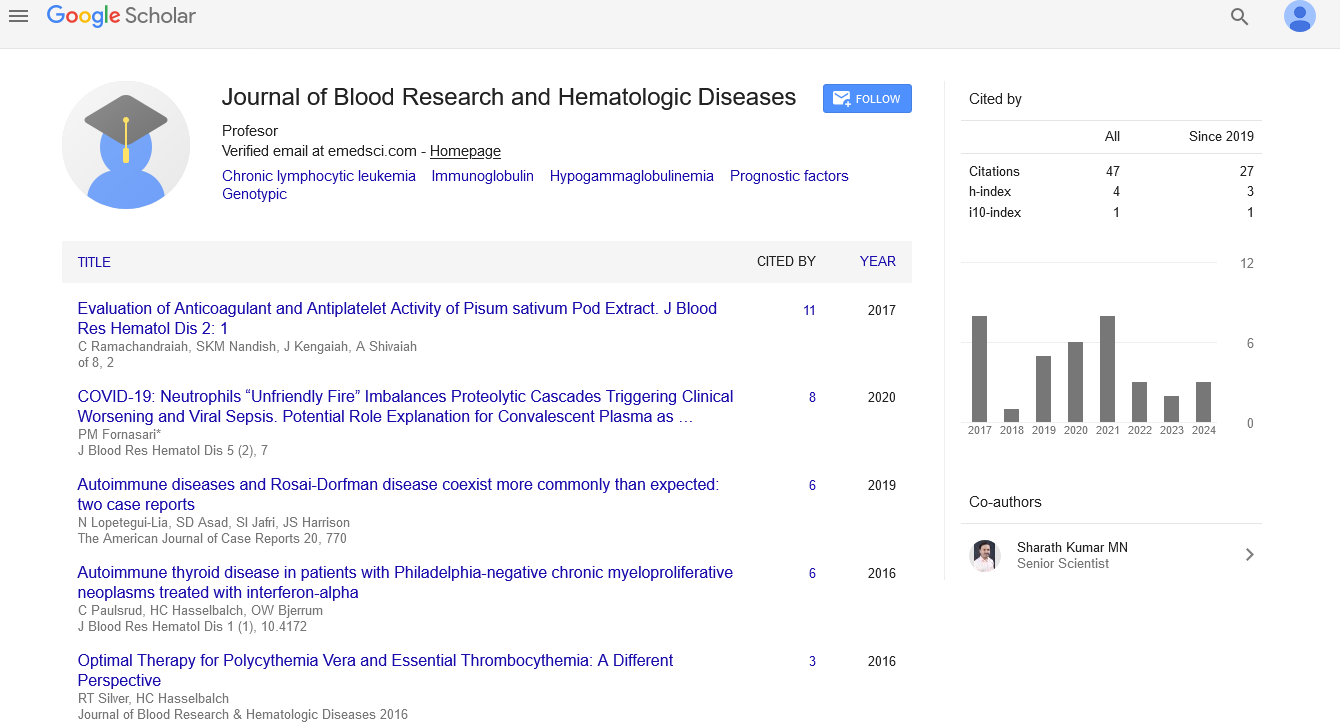Perspective, J Blood Res Hematol Dis Vol: 8 Issue: 3
Immunohematological Considerations in Solid Organ and Stem Cell Transplantation
Maxime Dubois*
1Department of Public Health, Erasmus University Medical Centre Rotterdam, Rotterdam, The Netherlands
*Corresponding Author: Maxime Dubois,
Department of Public Health, Erasmus
University Medical Centre Rotterdam, Rotterdam, The Netherlands
E-mail: maxime.dubois@gmail.com
Received date: 28 August, 2023, Manuscript No. JBRHD-23-115310;
Editor assigned date: 30 August, 2023, PreQC No. JBRHD-23-115310 (PQ);
Reviewed date: 13 September, 2023, QC No. JBRHD-23-115310;
Revised date: 21 September, 2023, Manuscript No. JBRHD-23-115310 (R);
Published date: 28 September, 2023, DOI: 10.4172/jbrhd.1000181
Citation: Dubois M (2023) Immunohematological Considerations in Solid Organ and Stem Cell Transplantation. J Blood Res Hematol Dis 8:3.
Description
Solid organ transplantation and stem cell transplantation have revolutionized modern medicine, offering life-saving treatments for a range of diseases. However, the success of these procedures depends not only on finding suitable donors but also on addressing important immunohematological considerations.
Solid organ transplantation
Solid organ transplantation involves the transfer of healthy organs, such as the heart, kidney, liver, lung, or pancreas, from a donor to a recipient. Successful transplantation relies on the compatibility between the donor and recipient, with several immunohematological factors coming into play.
Blood group compatibility: ABO blood group compatibility is a vital consideration in organ transplantation. A mismatch can lead to antibody-mediated rejection, potentially compromising the transplant's success. Accurate blood typing and crossmatching are essential to prevent these complications.
HLA matching: Human Leukocyte Antigen (HLA) compatibility is essential, especially for kidney and bone marrow transplants. A higher degree of HLA matching reduces the risk of graft rejection and the need for immunosuppressive medications.
Crossmatching: Crossmatching involves testing the recipient's serum against the donor's lymphocytes to assess compatibility. A positive crossmatch indicates a potential risk of hyperacute rejection and requires careful evaluation.
Desensitization: In cases of ABO or HLA incompatibility, desensitization procedures may be performed to reduce antibody levels in the recipient's serum before transplantation, increasing the chances of a successful outcome.
Stem cell transplantation
Stem cell transplantation, also known as Hematopoietic Stem Cell Transplantation (HSCT), is a vital treatment for various hematologic disorders, immune deficiencies, and certain solid tumors. Immunohematological considerations are equally vital in this context.
HLA matching: The degree of HLA matching between the donor and recipient is vital in HSCT. A high level of HLA compatibility minimizes the risk of Graft-Versus-Host Disease (GVHD) and graft rejection.
Graft-Versus-Host Disease (GVHD): GVHD is a severe complication of HSCT where the donor's immune cells attack the recipient's tissues. ABO and HLA compatibility play significant roles in GVHD risk assessment.
Blood product support: Patients undergoing HSCT often require frequent blood product transfusions, including red blood cells and platelets. Compatibility issues and the risk of alloimmunization must be closely monitored.
Immunohematological challenges and solutions
Immunosuppression: To prevent graft rejection, organ transplant recipients must take immunosuppressive medications. However, these drugs can increase the risk of infections and have hematologic side effects, including anemia and thrombocytopenia.
Solution: Close monitoring of blood counts and tailored interventions to manage anemia or bleeding complications.
Graft rejection: The recipient's immune system can recognize the transplanted organ or stem cells as foreign and mount an immune response against them.
Solution: Adequate immunosuppression and careful donor selection to minimize the risk of rejection.
Infections: Immunosuppressed transplant recipients are highly susceptible to infections, which can affect the hematologic system.
Solution: Vigilant infection surveillance, prophylactic antibiotics, and prompt treatment of infections.
Alloimmunization: Patients may develop alloantibodies against donor blood group antigens, posing challenges for future transfusions.
Solution: Close monitoring of antibody development and selecting compatible blood products for transfusion.
Future directions
Advancements in immunohematology continue to improve the outcomes of solid organ and stem cell transplantation:
HLA typing and matching: High-resolution HLA typing techniques enhance compatibility assessment, reducing the risk of complications.
Desensitization protocols: Ongoing study aims to refine desensitization strategies, expanding the pool of compatible donors for organ transplantation.
Immunosuppression: Novel immunosuppressive agents with improved safety profiles are under development, potentially minimizing hematologic side effects.
Blood product management: Enhanced blood product compatibility prediction tools and strategies to mitigate alloimmunization are being explored.
Conclusion
Immunohematological considerations are integral to the success of solid organ and stem cell transplantation. Compatibility assessment, prevention of graft rejection, and management of hematologic complications are vital aspects of these life-saving procedures.
Ongoing study and advancements in immunohematology offer hope for improved transplant outcomes and a brighter future for patients in need of these vital treatments. The intricate interplay between the immune and hematologic systems underscores the complexity and importance of these procedures in modern medicine.
